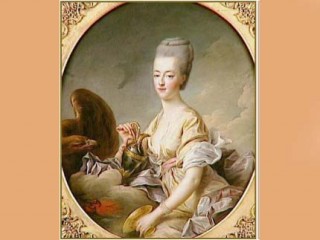
Marie Antoinette biography
Date of birth : 1755-11-02
Date of death : 1793-10-16
Birthplace : Vienna, Austria
Nationality : Austrian
Category : Arts and Entertainment
Last modified : 2010-05-24
Credited as : Archduchess of Austria , Queen of France and Navarre, Jean-Jacques Rousseau
At the age of fourteen, on the day of her marriage to Louis-Auguste, Dauphin of France, she became Dauphine de France. At the death of King Louis XV, in May 1774, her husband ascended the French throne as Louis XVI, and Marie Antoinette assumed the title of Queen of France and Navarre. After seven years of marriage she gave birth to a daughter, Marie-Thérèse-Charlotte, the first of their four children.
Known to her people as an outlandish and immoral queen of France, Marie Antoinette became a part of the French monarchy when her husband became enthroned as King Louis XVI. She would be satirized for her court extravagance, including one instance known as the diamond necklace incident with a cardinal, and would later be sentenced to death, decapitated in front of the same people whom she led.
Born into the elite family of the Holy Roman emperor Francis I, she later married the French Dauphin. With this marriage, she secured herself an indirect, but powerful place on the throne of France. During her first years as queen, she was known to be frivolous and unkempt in her relations. When news of her behavior became public, she would lose all of France’s faith in their rulers. She became a symbol of what the France did not want to become.
Throughout history, Marie Antoinette’s role in history has been blurry. In actuality, she was involved in both domestic and foreign politics, but not as much as was exaggerated after her death. While it is known that she was involved in certain courtly scandals and voicing her opinions in regard to Austria and Prussia, once she had children, she shied away from the public limelight. In addition to her own opinions, she supported the conservative side of the court, or the maintenance of the royal family as the head of the state – called the Old Regime.
By the end of 1790, the whole of France was getting tired of the monarchy and its ploys to control their liberty. Antoinette and her family were forced to move to Paris so that all the casuistry of the royal court could be monitored. Later, it was discovered that Marie had been working with constitutional monarchists. Once discovered, the royal family attempted to flee the country, but was caught. Following, she sought the aid of her brother, the Roman Emperor, Leopold II. In order to take recognition off of herself and France’s own internal problems, France declared war on Austria in 1792, but was thwarted with the quick formation of the French Republic. Marie Antoinette and her family were put into prison, where they would remain until she and her husband appeared before a French Tribunal that found her guilty of attempting to start a civil war in France. She and her husband were sent to the guillotine and put to death in front of a haunting crowd.
Historical legacy
Marie Antoinette's effect on the Revolution of France started well before 1789. By simply having a nationality of an Austrian origin, she was easily a target of ridicule and criticism. By altering several of the King's decisions, such as the removal of Jacques Necker from the office of finance Minister, introducing her political views to Louis XVI, and acting directly with the political assemblies of France, Marie Antoinette made an impact on the revolution that should not be taken lightly. With words placed in her mouth by the libelles, and rumors of illegitimate sexual encounters circulating throughout France, Marie Antoinette became an object of disgust and questionable motives. With these accusations reflecting onto the crown of the King, the legitimacy of the monarchy came into question. Without her influence on the King, his advisors, and the general public of France, the stability of the crown may not have been in question in the intensity that it was throughout the entirety of the revolutionary period.
In popular culture, the phrase "Let them eat cake" is often attributed to Marie Antoinette. However, there is no evidence to support that she ever uttered this phrase, and it is now generally regarded as a "journalistic cliché" which first appeared in The Confessions of Jean-Jacques Rousseau, written before Marie Antoinette even arrived in France.
















